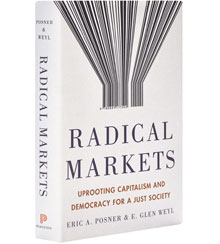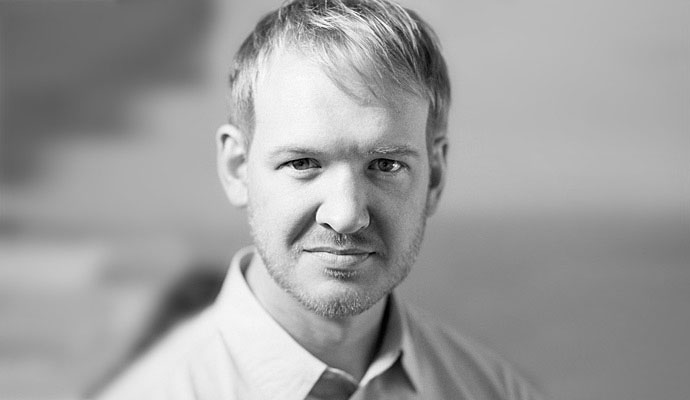How to Make Property Work Better for Society
In their new book, Eric A. Posner and E. Glen Weyl argue that rethinking the ownership of assets can lead to greater economic efficiency and equality. See also “Summer Reading: 8 Business Books – in Pictures”
A version of this article appeared in the Autumn 2018 issue of strategy+business.
Radical Markets: Uprooting Capitalism and Democracy for a Just Society
by Eric A. Posner and E. Glen Weyl, Princeton University Press, 2018
“Property,” French anarchist Pierre-Joseph Proudhon famously wrote, “is theft.” For this, among other radical political statements and beliefs, Proudhon was jailed — albeit rather gently, with regular furloughs from his Paris prison.
Each era gets its own version of “property is theft.” And now University of Chicago legal scholar Eric A. Posner and political economist E. Glen Weyl, a researcher at Microsoft, have delivered one for the era of markets. Radical Markets: Uprooting Capitalism and Democracy for a Just Society is an original and inventive effort at what you might call “market socialism.” It’s worth reading both for the practical ideas that can be repurposed for the current U.S. economy and for the interesting ways in which the authors’ more extreme ideas go wrong.
Posner and Weyl take the “uprooting capitalism” part of their title seriously. Although they seem leery of socialism or anarchism and don’t precisely follow Proudhon’s formulation, the first chapter, “Property Is Monopoly,” comes awfully close to it.
Property for Posner and Weyl involves two sins. First, it’s inefficient. Why have things when you are not using them? It’s the Shel Silverstein theory of property: “If I die before I wake, I pray the Lord my toys to break / So none of the other kids can use ’em.” Second, property lets you make money without labor. Open a riverfront restaurant, and while you spend all day and evening gutting fish, the owner of the waterfront property keeps most of the gains.
The setup is not dramatically different from the complaints that have been made about property for generations. The twist — the “radical markets” part — comes in the solutions Posner and Weyl advocate for the problem of property. Everyone who tries to find other ways of organizing things and uprooting capitalism runs into the very foreseeable difficulty that the obvious alternatives, starting with confiscation and proceeding to management by centralized five-year plans, are terrible. Bureaucrats, dictators, technocrats, and politicians all tend to come up with methods of allocating resources that are dramatically suboptimal.
Posner and Weyl want to find a way to have goods owned in common — or, in their words, make possessors “lessees from society” — without turning to central planners. They want to distribute goods in a way that’s fairer than “let the government decide” or “what’s yours is yours.” Their solution is something they call the common ownership self-assessed tax, or COST, which lets citizens express how much they value something and pay annual taxes based on that value. Investors can choose not to pay the COST on, say, a plot of land, but are then required to sell it to anyone who is willing to pay a price higher than its declared value.
That last part takes a lot of getting used to, and you’d need to spend a lot of pages (as Posner and Weyl do) to fully explain how it works. If you don’t want to sell something like the watch you inherited from your grandfather, you can pay a very low tax. But you can’t then change your mind and sell it for a lot if the price rises or your mood changes. On the other hand, if you’re an investor and want to profit from your possessions, you have to either pay a high tax to hold on to the assets or give them up for a reasonable price to buyers who can use them efficiently.
The interaction of these COSTs and the prices buyers are willing to pay is the “markets” part of Radical Markets. The book makes some fairly extreme claims for the benefits of the COST. Each chapter comes with a little science fiction introduction, in which everyone from hyper-speed train operators (those will exist) to garbage pickers (yes, those too) would make decisions about what they value to maximize the use of social resources. These are fun to contemplate, but setting the examples in the future largely lets Posner and Weyl skim over the limitations of the theory in the here and now.
Those are significant. As a general rule, the perception that property is a problem is not one that is shared outside academia. The book largely dismisses the aspirations that motivate the poor — aspirations of attaining middle-class status and, yes, ownership of property. Nor does it deal with the icky awkwardness of what happens when you forget to pay the COST on your house.
As a general rule, the perception that property is a problem is not one that is shared outside academia.
Radical Markets also shows a great degree of confidence in the ability of government to collect high taxes through COST assessments and then redistribute them in a way that makes everyone happy. This is a problem with many utopian economic models. In theory you can tax Paul for the pollution he emits on Peter’s land, then give the money to Peter. Or you can tax Peter and Paul and give them back social goods equal in value to what you collected. In real life, it rarely works out that simply.
Still, Radical Markets is a useful exercise because it also reveals public goods that are perhaps best not turned into property. The authors are aware that many of their readers will be looking for more immediate and less radical uses for their COST system for assets that are held by the government and need to be distributed; Posner and Weyl point to grazing rights, Internet domain names, and radio spectrum as examples. Here, alternatives to current approaches are useful. Around the world there have been some major successes in privatization — and some mixed results and failures. In general, the privatization of ex-Soviet enterprises may have been one of history’s great screwups. In the U.S., although spectrum auctions have raised a great deal of money for the public, they’ve also resulted in telecom markets that have a surprisingly small number of players.
You don’t have to buy Radical Markets’ exhortations to make property common to accept that access to coastal beaches or broadcast spectrum shouldn’t simply be sold to the highest bidder. There may be few takers for the radical position that all private property should be made public and leased back from the government. But it is not radical at all to say that some things we hold in common should be kept that way.
Author profile:
- Mark Gimein is a writer and editor in New York. He writes regularly about the economy for NewYorker.com and Time.com, and blogs at Chumpchanger.com.




